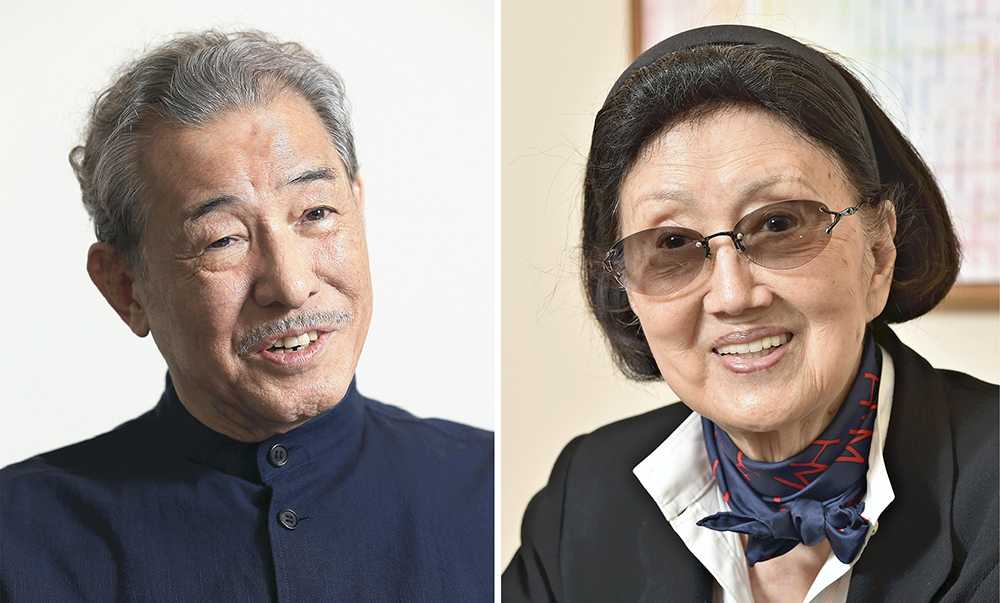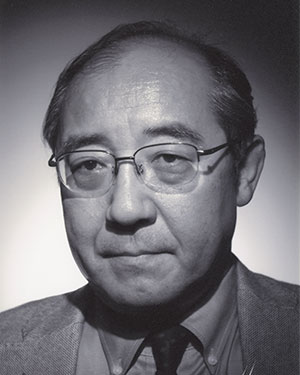- Fashion
- STYLE FILES
2 legendary designers share Tiger zodiac year in birth and death

Issey Miyake in 2015, left, and Hanae Mori in 2018
12:00 JST, September 2, 2022
Two iconic Japanese designers born in the Year of the Tiger died within a week of one another in August this year, also a Year of the Tiger. People born under the sign are said to be brave and romantic perfectionists.
On Aug. 5, Issey Miyake died from hepatocellular cancer at 84. Only six days later, on Aug. 11, Hanae Mori died of old age at 96. Mori was born on Jan. 8, 1926, and Miyake was born on April 22, 1938. That two such shining stars of the fashion world should be born under the same Chinese zodiac sign and then die within a few days of one another, again in a year of the same Tiger sign, seems beyond the realm of coincidence.
Everybody, including the designers themselves, knew the two were pioneers in Japanese fashion. There was even a kind of rivalry between them. Though they were not openly hostile to each other, they kept close track of one another’s achievements. For example, Mori became the first fashion designer to be decorated with the Order of Culture in 1996 at age 70. Fourteen years later in 2010, Miyake received the honor at 72. The race for decorations did not stop at Japan’s borders, either. In 2002, the French government decorated Mori with the Legion d’Honneur Officier order of merit, and in 2016, Miyake received an honor one rank above, the Legion d’Honneur Commandeur.
As fashion designers, the two pursued contrary visions. Miyake started by denying “elegance” and pursuing originality, while Mori’s designs were based on elegance. This choice must have cost Mori a tremendous amount of effort as she had to vie with the very best of the French elegance school at the time, including such household names as Dior, Chanel and Saint Laurent. Mori made the most of Japanese materials and traditions, as well as her delicate sensitivity as a Japanese woman. Her designs pulsed with the creative energy of an intelligent woman who had graduated from Tokyo Woman’s Christian University. She also devised the brand’s logo featuring a butterfly. According to Mori, winters were harsh in her hometown of Yoshika in Shimane Prefecture, and when spring came, butterflies would dance about leisurely outside. This scene from her childhood must have meant something special to her.
In 1979, Mori partnered with Fairchild Publishing, which publishes the New York-based trade journal WWD (Women’s Wear Daily), called the fashion bible in the industry. Together they launched WWD Japan, the Japanese version of the journal. This seems to have been part of Mori’s media strategy to break into the fashion industry in the West. Mori was also responsible for the publication of Ryuko Tsushin, a now-defunct fashion magazine that dominated the Japanese fashion scene from the late 1970s to the 1980s. Launched in 1966 and discontinued in 2008, Ryuko Tsushin had its origin in a public relations magazine for the Hanae Mori brand. Had she never become a designer, Mori would surely have succeeded in whatever other field she chose. That was the kind of woman she was.
Miyake, a Hiroshima native, used to say that he first become aware of design through the city’s Isamu Noguchi-designed Peace Bridge, a structure he was always sure to see on his commute to school. Miyake graduated from Tama Art University, meaning he was not one of the graduates from Bunka Fashion College who dominated the Japanese fashion industry after the end of World War II. But Miyake found his own unique way of approaching fashion.
Miyake produced a number of masterpieces through his innovative ideas on fabric use and sent shock waves through the Paris fashion industry. He was a maverick who refused to follow local customs, a destroyer who created his own rules. In the 1970s, he began to redefine what it meant to be a designer, and one could even call him a creative artist of fabrics. His collaborations with textile director Makiko Minagawa in particular amazed the world. In their works, they would use traditional fabrics from Okinawa Prefecture and India, sashiko embroidery and new approaches to synthetic material. Miyake also had a major influence on Rei Kawakubo (1942-), of Comme des Garcons, and Yohji Yamamoto (1943-), both of whom made their debuts at the 1981 Paris Fashion Week, thereby continuing the line of maverick Japanese designers.
If I were to pick one series from the veritable forest of Issey Miyake masterpieces, it would probably be Pleats Please, which also found great success commercially. This series triumphantly showcases Miyake’s true values in the creation of something completely new out of common materials using common techniques. One can feel a similar concept at work in the brand’s recent hit handbag series, Bao Bao Issey Miyake.
Besides Mori and Miyake, the past two years of the pandemic have laid to rest two other major figures active in spreading Japanese fashion around the world. Kansai Yamamoto died on July 21, 2020, at 76, and COVID-19 claimed Kenzo Takada on Oct. 4, 2020, at a Paris hospital at the age of 81.
If you’ll allow me a cliche, I can’t help feeling that this is the end of an era.

Akira Miura
Miura is a journalist and a former editor in chief of WWD Japan.



